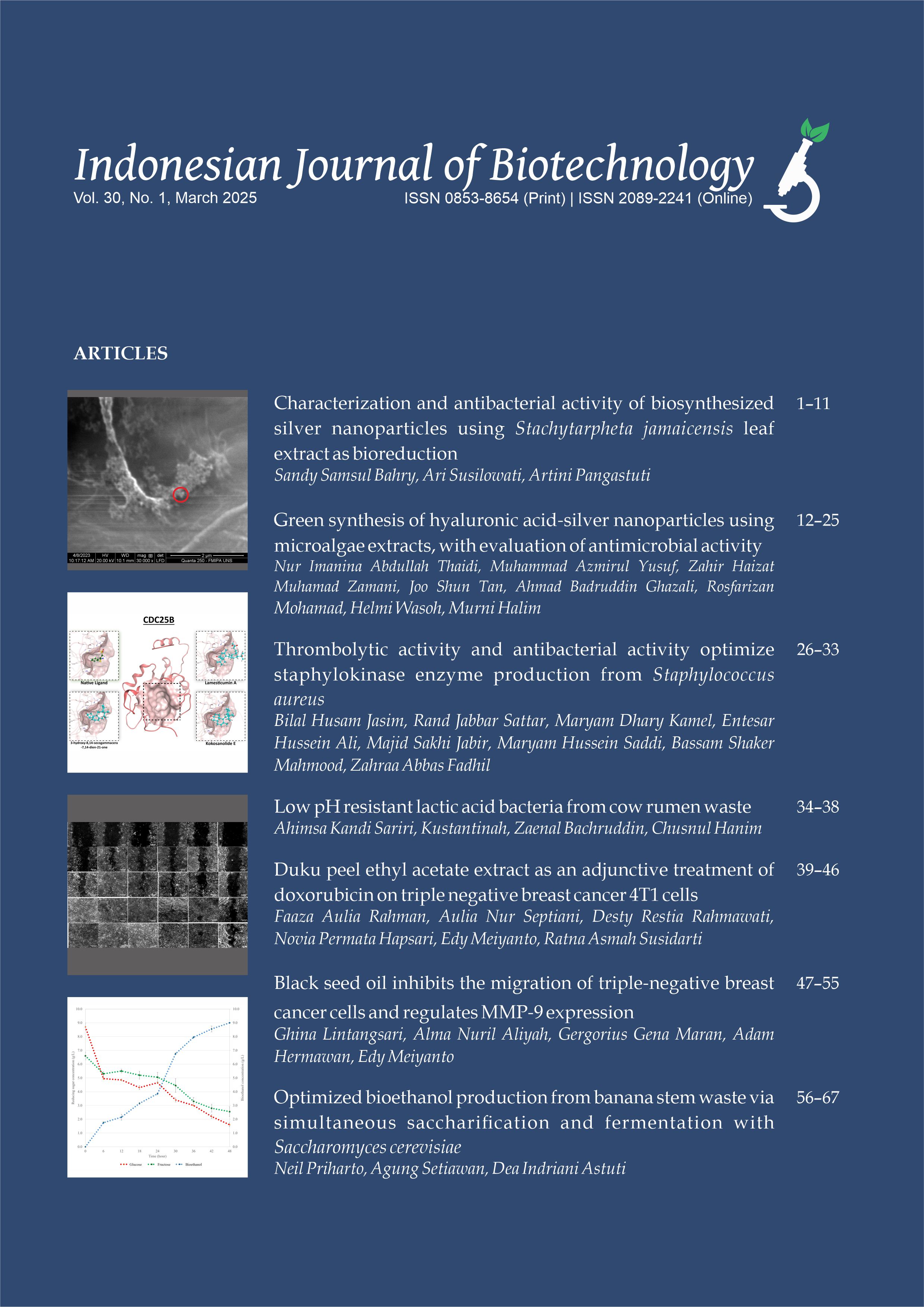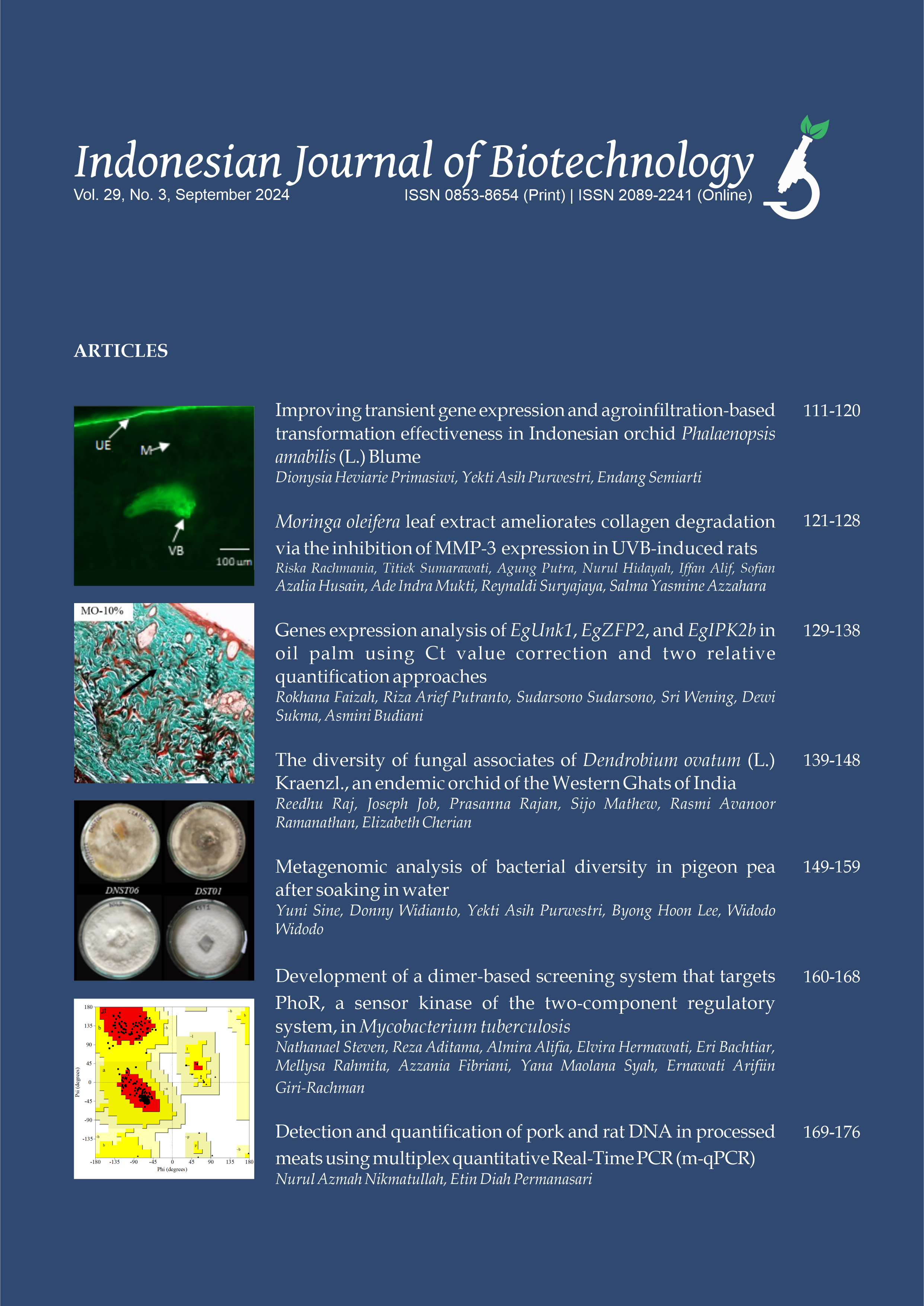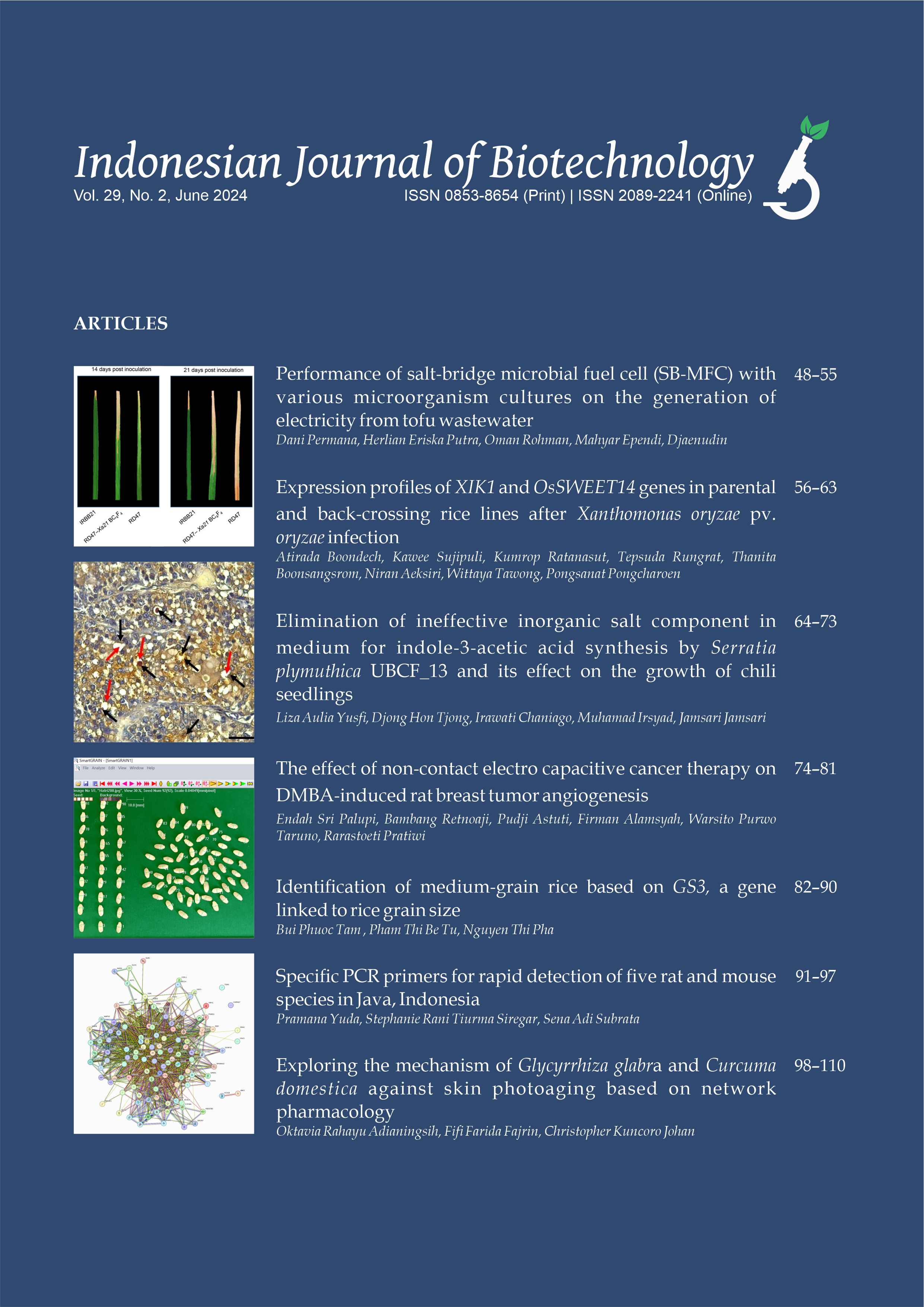Expression profiling of the CHS8, CHI1A, IFS2, and CHR genes in black soybean seed [Glycine max (L). Merr.] of F4 generation
Dadang Sumardi(1*), Aulia Marwah Mumtaza(2), Rijanti Rahaju Maulani(3), Adi Pancoro(4), Husna Nugrahapraja(5), Sony Suhandono(6), Tati Suryati Syamsudin(7), Agung Kurniawan(8)
(1) School of Life Sciences and Technology, Institut Teknologi Bandung, Jalan Ganesa 10, Bandung, Indonesia 40132
(2) School of Life Sciences and Technology, Insttut Teknologi Bandung, Jalan Ganesa 10, Bandung 40132
(3) School of Life Sciences and Technology, Insttut Teknologi Bandung, Jalan Ganesa 10, Bandung 40132
(4) School of Life Sciences and Technology, Insttut Teknologi Bandung, Jalan Ganesa 10, Bandung 40132
(5) School of Life Sciences and Technology, Insttut Teknologi Bandung, Jalan Ganesa 10, Bandung 40132
(6) School of Life Sciences and Technology, Insttut Teknologi Bandung, Jalan Ganesa 10, Bandung 40132
(7) School of Life Sciences and Technology, Insttut Teknologi Bandung, Jalan Ganesa 10, Bandung 40132
(8) School of Life Sciences and Technology, Insttut Teknologi Bandung, Jalan Ganesa 10, Bandung 40132
(*) Corresponding Author
Abstract
Keywords
Full Text:
PDFReferences
Akada S, Kung SD, Dube SK. 1993. Nucleotide sequence and putative regulatory elements of a noduledevelopmentspecific member of the soybean (Glycine max) chalcone synthase multigene family, Gmchs 7. Plant Physiol 102(1):321–323.
Cheng B, Furtado A, Smyth HE, Henry RJ. 2016. Influence of genotype and environment on cof fee quality. Trends Food Sci Technol 57:20–30. doi:10.1016/j.tifs.2016.09.003.
Chiari L, Koshy Naoe L, Piovesan ND, Chamel José I, Damião Cruz C, Alves Moreira M, Gonçalves De Barros E. 2006. Inheritance of isoflavone con tents in soybean seeds. Euphytica 150(12):141–147. doi:10.1007/s106810069102y.
Christie JM, Jenkins GI, Christie JM, Jenkins GI. 1996. Distinct UVB and UVA/blue light signal transduc tion pathways induce chalcone synthase gene expres sion in Arabidopsis cells. Plant Cell 8(9):1555–1567. doi:10.2307/3870250.
Dajanta K, Janpum P, Leksing W. 2013. Antioxidant ca pacities, total phenolics and flavonoids in black and yellow soybeans fermented by Bacillus subtilis: A comparative study of Thai fermented soybeans (thua nao). Int Food Res J 20(6):3125–3132.
Dhaubhadel S. 2011. Regulation of Isoflavonoid Biosyn thesis in Soybean Seeds. In: TB Ng, editor, Soybean Biochemistry, Chemistry and Physiology, pages 243–358. Canada: IntechOpen. doi:10.5772/15120.
Dhaubhadel S, Gijzen M, Moy P, Farhangkhoee M. 2007. Transcriptome analysis reveals a critical role of CHS7 and CHS8 genes for isoflavonoid synthe sis in soybean seeds. Plant Physiol 143(1):326–338. doi:10.1104/pp.106.086306.
Dixon RA. 2004. Phytoestrogens. Annu Rev Plant Biol 55:225–261. doi:10.1146/annurev.arplant.55.031903.141729.
Fritze K, Staiger D, Czaja I, Walden R, Schell J, Wing D. 1991. Developmental and UV light regulation of the snapdragon chalcone synthase promoter. Plant Cell 3(9):893–905. doi:10.1105/tpc.3.9.893.
GutierrezGonzalez JJ, Guttikonda SK, Tran LSP, Aldrich DL, Zhong R, Yu O, Nguyen HT, Sleper DA. 2010. Differential expression of isoflavone biosynthetic genes in soybean during water deficits. Plant Cell Physiol 51(6):936–948. doi:10.1093/pcp/pcq065.
Juenger TE, Sen S, Bray E, Stahl E, Wayne T, Mckay J, Richards JH. 2010. Exploring genetic and expression differences between physiologically ex treme ecotypes: Comparative genomic hybridiza tion and gene expression studies of Kas1 and Tsu1 accessions of Arabidopsis thaliana. Plant, Cell Environ 33(8):1268–1284. doi:10.1111/j.1365 3040.2010.02146.x.
Jung W, Yu O, Lau SMC, O’Keefe DP, Odell J, F G, Mc Gonigle B. 2000. Identification and expression of isoflavone synthase, the key enzyme for biosynthesis of isoflavones in legumes. Nat Biotechnol 18(2):208– 212. doi:10.1038/72671.
Lam HM, Xu X, Liu X, Chen W, Yang G, Wong FL, Li MW, He W, Qin N, Wang B, et al. 2010. Resequencing of 31 wild and cultivated soybean genomes identifies patterns of genetic diversity and selection. Nat Genet 42(12):1053–1059. doi:10.1038/ng.715.
Marioni JC, Mason CE, Mane SM, Stephens M, Gi lad Y. 2008. RNAseq: An assessment of tech nical reproducibility and comparison with gene ex pression arrays. Genome Res 18(9):1509–1517. doi:10.1101/gr.079558.108.
Maston GA, Evans SK, Green MR. 2006. Tran scriptional Regulatory Elements in the Human Genome. Annu Rev Genomics Hum Genet 7:29–59. doi:10.1146/annurev.genom.7.080505.115623.
McKay JK, Richards JH, MitchellOlds T. 2003. Genet ics of drought adaptation in Arabidopsis thaliana: I. Pleiotropy contributes to genetic correlations among ecological traits. Mol Ecol 12(5):1137–1151. doi:10.1046/j.1365294X.2003.01833.x.
Park HB, Jacobsson L, Wahlberg P, Siegel PB, Andersson L. 2006. QTL analysis of body composition and metabolic traits in an inter cross between chicken lines divergently selected for growth. Physiol Genomics 25(2):216–223. doi:10.1152/physiolgenomics.00113.2005.
Ramandhani MR. 2014. Penerapan Pattern Matching dalam Penentuan Pewarisan Sifat Genetis Tetua pada Anaknya. URL http://informatika.stei.itb.ac.id/{~}r inaldi.munir/Stmik/2013-2014/Makalah2013/MakalahIF22112013029.pdf.
Sheffield JB. 2008. An Introduction to ImageJ: A Useful Tool for Biological Image Processing and Analysis. Microscopy and Microanalysis doi:DOI: 10.1017/S1431927608088752.
Stranger BE, Nica AC, Forrest MS, Dimas A, Bird CP, Beazley C, Ingle CE, Dunning M, Flicek P, Koller D, et al. 2007. Population genomics of human gene expression. Nat Genet 39(10):1217–1224. doi:10.1038/ng2142.
Veyrieras JB, Kudaravalli S, Kim SY, Dermitzakis ET, Gilad Y, Stephens M, Pritchard JK. 2008. High resolution mapping of expressionQTLs yields in sight into human gene regulation. PLoS Genet 4(10):e1000214. doi:10.1371/journal.pgen.1000214.
Xu B, Chang SKC. 2008. Antioxidant capacity of seed coat, dehulled bean, and whole black soybeans in relation to their distributions of total phenolics, pheno lic acids, anthocyanins, and isoflavones. J Agric Food Chem 56(18):8365–8373. doi:10.1021/jf801196d.
Yu O, Shi J, Hession AO, Maxwell CA, McGonigle B, Odell JT. 2003. Metabolic engineering to in crease isoflavone biosynthesis in soybean seed. Phy tochemistry 63(7):753–763. doi:10.1016/S00319422(03)003455.
Zeyl C, Andreson B, Weninck E. 2005. Nuclear mitochondrial epistasis for fitness in Saccha romyces cerevisiae. Evolution 59(4):910–914. doi:10.1111/j.00143820.2005.tb01764.x.
Article Metrics
Refbacks
- There are currently no refbacks.
Copyright (c) 2020 The Author(s)

This work is licensed under a Creative Commons Attribution-ShareAlike 4.0 International License.









